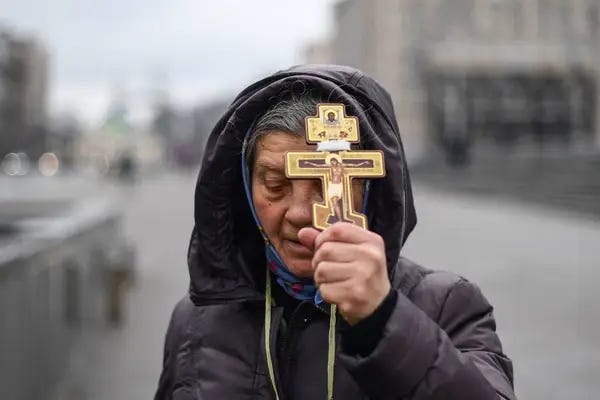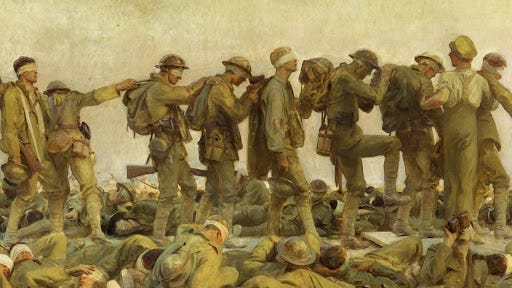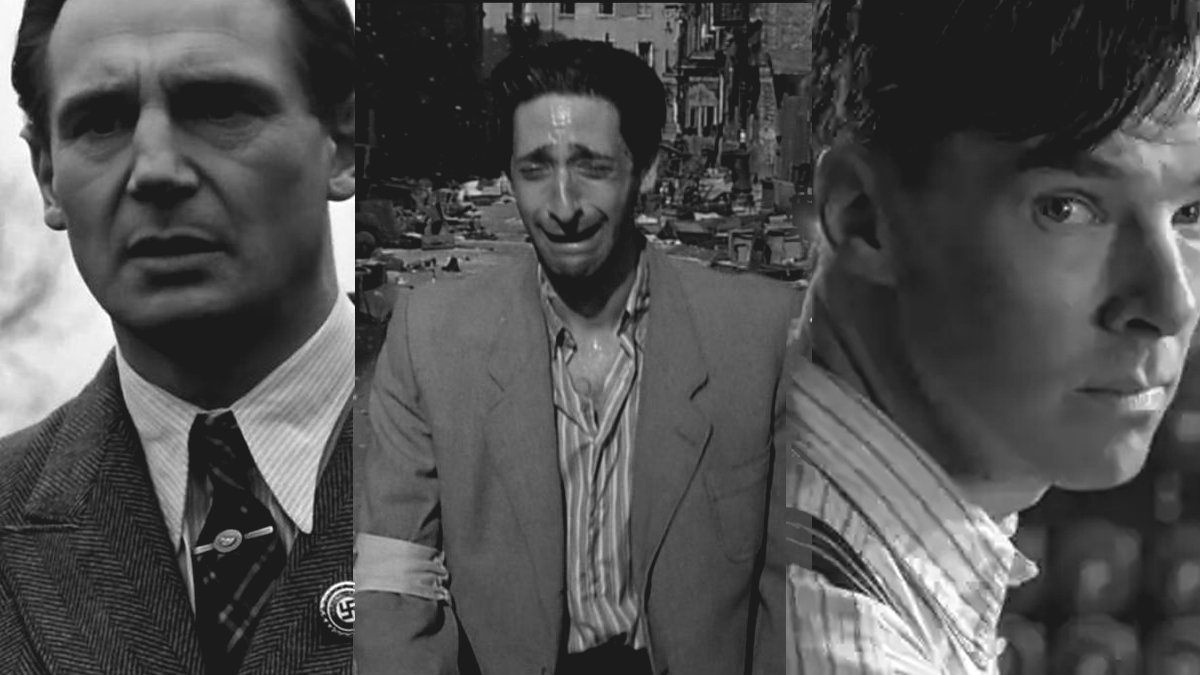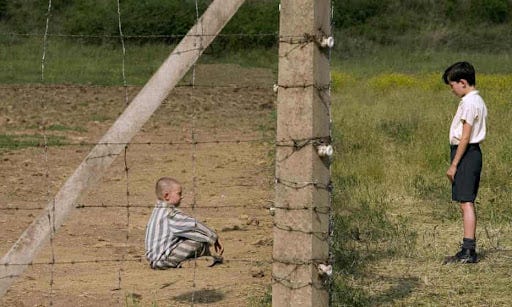Not Someone Else's War
"In today's world, where we live, there is no longer someone else’s war. None of you can feel safe when there is a war in Ukraine, when there is a war in Europe." — Volodymyr Zelensky
It took 3.5 billion years for life to evolve into something smart enough to destroy itself. War is not part and parcel of human nature. There's a reason we have to train soldiers to go to war. We have to strip them of their humanity so they are capable of killing at will, and even then, many of them can't. We have to build missiles and rockets that kill at a distance, so we can pretend it's all a game, so it feels less brutal.
We think of war as something so natural that we ignore the signs of it, and when it happens, we pray that it's far, far away from us. But when there is nothing left besides mud, wire, and slaughter, there is art. Throughout history, tools of cruelty have been turned into testaments of compassion.
Human ash fertilises to become art. It helps us imagine what a more humane world could look like. The social ideologies that govern our lives can seem so deeply entrenched; systems of capitalism and production or justified poverty can seem inherent to life on Earth. But the reality is that we can correct injustices — only if we can imagine new ways of living.
With murals, illustrations, poetry, and posters, people give birth to a hope that is forbidden. Art catalyzes movements; art is the blood of change. Today, we shall celebrate victories, honour the fallen, mourn losses, report atrocities, and rebel against those who turn a blind eye. Today, we shall let art from the trenches save us, yet again.
“There was no really good true war book during the entire four years of the war. The only true writing that came through during the war was in poetry. One reason for this is that poets are not arrested as quickly as prose writers”
– Ernest Hemingway, in “Men at War”
In submitting our conscience to war poetry, we are inviting more humane ideologies for the world to spin around; poetry is the combined voice of all those who were stripped of life, of survival, of homes, and war poetry is a sacred testament to their first-hand experience of meagre hope amid the soils of naked brutality.
No War by Halyna Kruk, Translated by Amelia Glaser and Yuliya Ilchuk

You’re standing with a “No war” sign as if indulging the inevitable: this war can’t be stopped, like bright arterial blood from an open wound it flows till it kills, it enters our cities with the armed men, seeps into our courtyards with the reconnaissance units, like deadly mercury beads that can’t be put back, you can’t fix it, except to find and neutralize it, these civilian managers, clerks, IT-guys and students, life didn’t prepare them for street fights, but the war did, on the frontline, in a painfully familiar landscape, in a hurry at first they only recruit experienced combat fighters to the defense units, after that gamers who play Dune and Fallout, or maybe if you’ve had a short-course in Molotov cocktails from a bartender you know, at the local club while the kids are asleep, the kids are crying, the kids are being born into a world temporarily unfit for life Out on the playground they’re assembling Czech hedgehogs, and nuclear families are mixing deadly “drinks.” whole families, finally enjoying a conversation and a collective project—war shortens the distance from person to person, from birth to death, from what we never wished for— to what it turned out we were capable of “Mom, pick up the phone,” a woman’s been pleading for two hours in the apartment building basement, stubborn and dense, she won’t stop believing in a miracle but her mother is out of cell phone range, in the suburbs, where the prefab collapsed like cheap Legos from the massive strikes, where just yesterday broadcast towers stopped connecting people, where the world got blown up into pre- and post-war along the uneven fold of the “no war” sign, which you’ll toss in the nearest trash, on your way home from the protest, Russian poet, war kills with the hands of the indifferent and even the hands of idle sympathizers.
When I am Overcome By Weakness By Najat Abdul Samad, Translation: Ghada Alatrash

When I am overcome with weakness, I bandage my heart with a woman’s patience in adversity. I bandage it with the upright posture of a Syrian woman who is not bent by bereavement, poverty, or displacement as she rises from the banquets of death and carries on shepherding life’s rituals. She prepares for a creeping, ravenous winter and gathers the heavy firewood branches, stick by stick from the frigid wilderness. She does not cut a tree, does not steal, does not surrender her soul to weariness, does not ask anyone’s charity, does not fold with the load, and does not yield midway. I bandage my heart with the determination of that boy they hit with an electric stick on his only kidney until he urinated blood. Yet he returned and walked in the next demonstration. I bandage it with the steadiness of a child’s steps in the snow of a refugee camp, a child wearing a small black shoe on one foot and a large blue sandal on the other, wandering off and singing to butterflies flying in the sunny skies, butterflies and skies seen only by his eyes. I bandage it with December’s frozen tree roots, trees that have sworn to blossom in March or April. I bandage it with the voice of reason that was not affected by a proximate desolation. I bandage it with veins whose warm blood has not yet been spilled on the surface of our sacred soil. I bandage it with what was entrusted by our martyrs, with the conscience of the living, and with the image of a beautiful homeland envisioned by the eyes of the poor. I bandage it with the outcry: “Death and not humiliation.”
Five Ways to Kill a Man By Edwin Brock
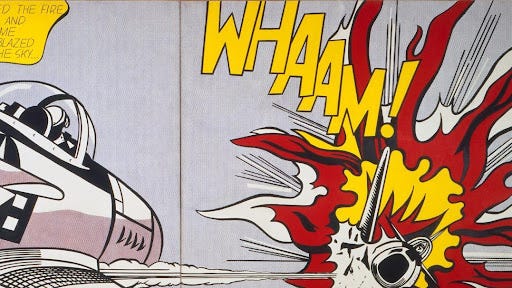
There are many cumbersome ways to kill a man. You can make him carry a plank of wood to the top of a hill and nail him to it. To do this properly you require a crowd of people wearing sandals, a cock that crows, a cloak to dissect, a sponge, some vinegar and one man to hammer the nails home. Or you can take a length of steel, shaped and chased in a traditional way, and attempt to pierce the metal cage he wears. But for this you need white horses, English trees, men with bows and arrows, at least two flags, a prince, and a castle to hold your banquet in. Dispensing with nobility, you may, if the wind allows, blow gas at him. But then you need a mile of mud sliced through with ditches, not to mention black boots, bomb craters, more mud, a plague of rats, a dozen songs and some round hats made of steel. In an age of aeroplanes, you may fly miles above your victim and dispose of him by pressing one small switch. All you then require is an ocean to separate you, two systems of government, a nation's scientists, several factories, a psychopath and land that no-one needs for several years. These are, as I began, cumbersome ways to kill a man. Simpler, direct, and much more neat is to see that he is living somewhere in the middle of the twentieth century, and leave him there.
The Death Of The Ball Turret Gunner By Randall Jarrell

From my mother's sleep I fell into the State, And I hunched in its belly till my wet fur froze. Six miles from earth, loosed from its dream of life, I woke to black flak and the nightmare fighters. When I died they washed me out of the turret with a hose.
युद्ध और बच्चे / उषा दशोरा

1. जब युद्ध की घोषणा हुई तब हँसते हुए बच्चे फूल वाले पौधों को पानी दे रहे थे उनकी हँसी के भार से डरी कई बंदूकें पौधों के पीठ के पीछे जा छुपीं उनमें फूल के बीज होने की जिद होने लगी जिद थी कि देह पर फूटे मीठी गंध जिद थी कि बस फूल खिले माथे पर दुनिया की समस्त बंदूकें फूल बन जाएं इस उम्मीद की मौत नहीं होनी चाहिए क्योंकि अभी सींचने हैं बच्चों को धरती के सारे फूल। 2. बरसों पहले प्रथम विश्व युद्ध और द्वितीय विश्व युद्ध की तारीखों को रटते-रटते उस बच्चे ने इतिहास की कॉपी में इन प्रश्नों के आस-पास युद्ध से कभी न लौटकर आने वाले अपने पिता के असंख्य चित्र बनाए थे उस दिन से आज तक ये तारीखें चुपचाप गीली आँखें लिए संसार के प्रत्येक बच्चे से क्षमा माँग रही हैं। 3. सीमा पर युद्ध चल रहा था और टी वी पर सत्ताईस सैनिकों के मरने की उन्नीस के लापता होने की खबर आई उसी समय सातों महाद्वीपों पर ढेर बच्चे बस्तों में हजारों प्रार्थनाएँ भर स्कूल बस के इंतजार में खड़े थे ताकि वे भविष्य में विश्व के सभ्य और शांत नागरिक बन सकें। 4. आज ही युद्ध खत्म हुआ था और अब बारूद के कारखानों की अंतिम इच्छा थी कि वे खेल के मैदान बन जाएँ उनकी छाती पर दौड़ें असंख्य मुस्कराते बच्चे छुपम-छुपाई, पकड़म-पकड़ाई की हँसी उनके जले हुए काले फेफड़ों को साँस दे बच्चों की हँसी बोधिवृक्ष है उसी की जड़ों में मिट्टी होकर बारूद के कारखानों की अब बुद्ध होने की तीव्र इच्छा है युद्ध के समर्थकों सुनो! हमें ऐसी महान इच्छाओं का सम्मान करना चाहिए।
आदमी की सुगंध / नवल शुक्ल
यह जो उथल-पुथल हो रही है बाज़ार को छूट दी जा रही है कम किए जा रहे हैं आग्नेयास्त्र शांति के शब्द बोले जा रहे हैं वह सांत्वना है सिर्फ़ थोड़े समय की राहत बहुत अधिक दिखावट। इस समय सबसे अधिक बदहाल है दुनिया सबसे अधिक ख़ाली है पेट। तमाम उन्नत तकनीक और विश्व के विकास की रपटों के ये अभी भी, एक ही पल में धूल, धुआँ और विकिरण से भर देंगे पृथ्वी पृथ्वी अभी भी ख़ाली है जल से हरियाली से, अन्न स आदमी की सुगंध से।
युद्ध के ख़िलाफ़ एक कविता / फ़िरोज़ ख़ान

भले मुझे निष्कासित कर दो इस मुल्क, इस दुनिया-जहान से लेकिन मैं एक अपराध करना चाहता हूँ मैं चाहता हूँ बग़ैर हथियारों वाली एक दुनिया मैं चाहता हूँ हज़रत नूह की तरह मैं भी एक नाव बनाऊँ दुनिया के तमाम हथियार भर दूँ उसमें और बहा दूँ किसी बरमूड़ा ट्राइंगल की जानिब मैं बेदख़ल कर देना चाहता हूँ दुनिया भर की तमाम पुलिस फ़ोर्स को छीन लेना चाहता हूँ फ़ौजियों के मेडल जो सरहदों पर किन्हीं के ख़ून का हिसाब हैं मैं सरहदों को मिटा देना चाहता हूँ या कि वहाँ बिठा देना चाहता हूँ फ़ौजियों की जगह दीवानों को मीराँ को, सूर, कबीर, ख़ुसरो, फ़रीद, मीर, ग़ालिब, फ़ैज़, जालिब और निदा को इतिहास की किताबों से पोंछ देना चाहता हूँ जीत की गाथाएँ हार की बेचैनियाँ ध्वस्त कर देना चाहता हूँ क़िलों, महलों में टँके जंग के प्रतीक-चिह्न संग्रहालयों में रखे हथियारों की जगह रख देना चाहता हूँ दुनिया भर के प्रेम-पत्र मैं लौट जाना चाहता हूँ हज़ारों साल पीछे और मिटा देना चाहता हूँ तमाम धर्मग्रंथों से युद्ध के क़िस्से छीन लेना चाहता हूँ राम के हाथ से धनुष राजाओं, शहंशाहों के हाथ से तलवार मिटा देना चाहता हूँ कर्बला की इबारत मैं कुरुक्षेत्र, कर्बला और तमाम युद्धस्थलों को लिख देना चाहता हूँ खेल के मैदान मैं कविताओं से सोख लेना चाहता हूँ वीर रस एक कप चाय के बदले सूरज की तपिश को दे देना चाहता हूँ तमाम डिक्शनरियों के हिंसक शब्द हिंसा के ख़िलाफ़ कहे और लिखे गए मैं अपने हिंसक शब्दों के लिए माफ़ी चाहता हूँ!
No sigh of breath was left unscathed from the touch of war, and their wounds bled through the pages of literature. The personal experiences of civilians crossed roads with the biting politics and historical cognizance, their expression wasn't merely a tool of communication, but an attempt to understand the walls closing down on them. This genre marked a revolution in columns of art and left an impact on society as a whole. To delve deeper into the topic at hand, the articles below are a thorough reflection of the journey.
Poetry, Protest and Propaganda — a Journey of Art Through Centuries of War
We have come a long way from where we began. Time has shifted, so have the tectonic plates. What remains terrifyingly constant is, people in power thinking that their needs and wants are more important than others’. And history still shamelessly repeating itself. War is the worst evil that people have inflicted upon one another, at costs to themselves, since some hominid discovered the lethal efficacy of rocks.
But when there is nothing left besides mud, wire, and slaughter, there is art.
Front-line participants in war have carved art from the flotsam of battle — bullets, shell casings and bones — often producing unsettling accounts of the calamity that had overwhelmed them. Tools of cruelty have been turned into testaments of compassion, and civilians have created art out of rubble.
Warriors expressed their inner lives on the walls of underground trenches, when the world, on the surface, was turning to hell.
War poems capture the darkest moments in human history, and also the most luminous. From ancient texts to modern free verse, war poetry explores a range of experiences, celebrating victories, honouring the fallen, mourning losses, reporting atrocities, and rebelling against those who turn a blind eye.
Changing the Dynamics of a ‘War Cinema’‘ using ‘Conflict’ as the Lens
‘War Cinema’ have a stereotyped expectation around them which most of the film makers only manipulate with creative liberty but never muster the bravery to transcend it beyond the war cries, dark settings, patriotic soldiers, hyper nationalism etc. The other attempt is the parodic and satirical representation of war with slapstick comedy which is used as a device to dabble into but not allow an immersive confrontation for its viewers. I say this is without prejudice this genre of films at its intrinsic nature. However, what Movies and film makers more often than not fail to ask themselves is, ‘Where is the War?’ and ‘Who are the subjects of the War?’. The lens generally focuses on ‘What is the War?’ leaving a perspective that is claustrophobic for it is born and dies on a territory of its manifestation when the landscape of its repercussion lies out of it.
At the core of a war lies the innumerable conflicts of individuals who do not dawn a camouflaged uniform but rather try to live such a life with a semblance of hope. Behind the cataclysmic events depicted through audacious decibels and explosions, there is a stilted quiet, a convoluted and monotonous silence that mechanically operates behind the scenes. It is these silences that nurture the peace from its extinction. The Horrors of war are not always painted with the hues of blood spilled on the battlefields, it also ricochets off the refugee camps, evacuation operations and the vessels carefully arranged in the kitchens.
The Biopic Genre has brought about a change in the narrative of war movies which now focus the lens on the individual around whom the war is revolving. However, even in these movies, the chosen individual epicentre for all the obvious reasons would be Political Personality whose decisions are pulling the triggers. Steven Spielberg in 1994, Roman Polanski in 2004 and Morten Tyldum in 2014 though have created movies that have used the epicentre to shift the gaze and broaden the horizons of a ‘War Cinema’.
The Boy in Striped Pyjamas - Beyond the Fence
In the mouth of war, humanity decays. It's only the living who know of their motherland, the dead only survives in the soils of history.
History is known to travel, to seek fingers that stroke, heads that turn, mouths that sing, hands that pen, feet that move to its rhythm; history reaches out in the palms of art and we bow to gulp, time and again. And these lips that don't shy away from the naked rot of atrocities, who are we if not facilitators of change?
The Boy in Striped Pyjamas, adapted from a novel of the same title written by John Boyne, set in the backdrop of World War II confronts the holocaust and the brutalities of Nazi prejudices, largely seen through the lens of two eight-year-olds. Bruno is son to a Nazi Commandment, wilding through the folds of his childhood with his best friends in Berlin only to find out they are expected to move to another place because of his father's job, located near a concentration camp he knows little to nothing about. The house is always surrounded by guards and servants with respectable past professions leaving him utterly confused and unhappy. His explorer side itches him to wander through the woods to find his own adventures, and one such adventure turns his life around.
Read the complete article "The Boy in Striped Pyjamas - Beyond the Fence" by Resham
We've compiled a collection of war photos and posters for you. It features pictures of troops, landscapes, town views, and post-battle burial grounds, as well as posters from World Wars I and II that were intended to persuade individuals to fulfil their duty and join the military services.
Click here to see our curation of war photographs and posters
How we respond and react to the genre of war literature is a pronouncement of the path we choose to ascend as a nation. It is a proclamation of our historical consciousness and humaneness, of our empathy and societal awareness. There's no war that spills no blood, and there's no art outside this blood; it flows within and into and afar, it reaches out to you until all you remember is peace and not what took place to acquire its birth.
Whilst we acknowledge the importance and impact of poetry through various folds of history, we are very close to the month that celebrates poetry in all its glory, and we are excited to take this journey of NaPoWriMo with you this April.
Contributors: Aishwarya Roy, Resham Sharma, Shama Mahajan, Shivam Tomar





